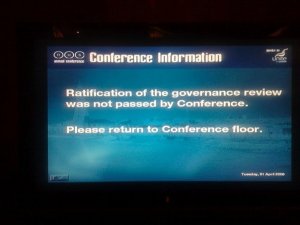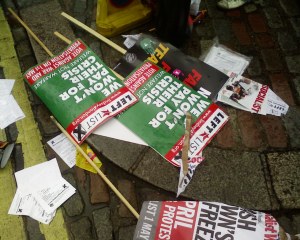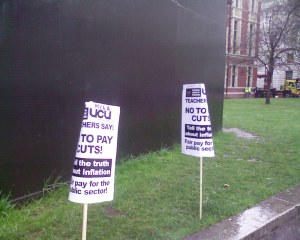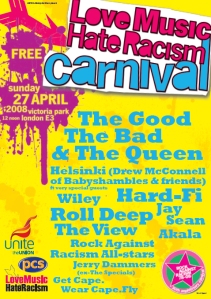Metaphorical analysis of New Labour
Crewe and Nantwich results
Edward Timpson
Conservative: 20,539
Tasmin Dunwoody
Labour: 12,679
Elizabeth Shenton
Lib Dems: 6,040
New Labour is in meltdown. That’s a 17.6% swing, Labour did have a 7,000 majority, it wasn’t even on the list of 150 marginal Labour seats! The Tories are the main beneficiaries, but have benefited only be posing themselves to the left of Labour on issues like the 10p tax rate and sweeping up the populist right wing vote as well.
Labour is likely to take a marked swing to the right after the Crewe election, which means that immigrants will come under sustained attack, hospitals and schools will be privatised, and pay cuts more extreme, while bosses rake in more profit.
All of which will benefit the BNP, as New Labour continues to alienate it’s own working class supporters and stoke up racism which the far right will benefit from. Love Music, Hate Racism and Unite Against Fascism have called a national demo on 21st June in central London and it looks like we’ve got our work cut out to clear up the mess.
Boris and five pledges
I’ve got a few ideas for five ‘pledges’
1. Leave
2. Never come back
3. Spend a night in the roughest part of Liverpool
4. Be fired out of a cannon…
5. …into the sun
Nick Broomfield and the Battle of Haditha

Battle of Haditha centres around true life events, when marines in the US army went on a rampage in a suburb of Haditha after falling victim to a roadside land mine. The marines kill 19 innocent Iraqis, some as young as 3 and as old as 76. For those of you who do not know who Nick Broomfield is, he is the director of Battle of Haditha and also the equally good, if not better, Ghosts (2006), about the 22 Chinese cockle pickers killed on Morecambe Bay.
Broomfield’s documentary style is a little controversial, he has deliberately chosen high profile events and changed some of the reality of the events. The result is a fact based drama, I think the reasoning for this shift is political.
Firstly, would Ghosts have made the same impact if it chose to approach the subject as a straight documentary? Can we get a sense of what it is like to work as a Chinese illegal immigrant, having to work up to 16 hours a day, with two jobs, below the minimum wage and shafted by landlords and agency firms for money? Would Broomfield have been able to even get close to the illegal shipping of persons from China, or the illegal employment of immigrants on destitute wages? The answer is a resounding no, as the this Guardian article puts it:
Would Ghosts have functioned just as successfully as a straight documentary? One can easily imagine Broomfield interviewing the Morecambe bay survivors and door-stepping the corrupt enforcers (Chinese and English) at their suburban homes. But perhaps that would have lacked the claustrophobic intensity of this fact-based fiction; the sense of being inside looking out, as opposed to the other way around.
The main bulk of Ghosts is based on the experiences of a female Chinese Guardian journalist, who worked undercover as an illegal immigrant to expose the trafficking of people from China, she ended up in Lowestoft (of all fucking places) as a farm labourer, unable to pay for the goods she produces from the local supermarket and living in squalid cramped conditions.
Eventually the immigrants end up in Morecambe picking cockles and it is here when political reality and the depiction of reality in films collided. While filming the crew and actors were subject of a violent racist attack by real English cockle pickers, Broomfield then used the filming of this attack in the film to draw attention to illegal labour being used by capitalism to sustain profits, while persecuting and sustaining racism towards that very minority. It is the only ‘real’ event to happen in this documentary about ‘reality’.
The same is used to similar effect in Battle of Haditha, the roadside bomb was planted by two Iraqi resistance members, while in reality, the roadside bomb was in fact a landmine. The portrayal of the two Iraqis gives Broomfield the opportunity to show the Iraqi resistance as ordinary human beings motivated by the violence of the oppressor and the occupation to commit acts of terrorism, while their leaders are still shown to be the Western caricature of Islamists, the ‘ordinary’ Iraqis drink, swear and aren’t good at their job. Both the soldiers and the resistance members (after their bomb provokes the massacre in Haditha) are shown to feel regret for their role.
It’s still far from the description of the resistance in the film by Louis Proyect as bloodthirsty militants, though this may be because he sees the resistance with rose-tinted spectacles. Proyect also argues that end scene where a soldier rescues a child is reminiscent not of reality but of some Hollywood movie, I agree more with this assertion from Proyect, humanism isn’t usually found in war, but at least it gave Broomfield the chance to paint the marines as being human and sickened by their actions.
So far from showing “innocent civilians being caught between the pincers of an occupying army and a bloodthirsty insurgency” Broomfield twists reality to show the true problem in Iraq, the occupation, and it is only when that changes, when things may return to some kind of normality.
Battle of Haditha has been used a number of times by the Stop the War Coalition to highlight the brutality of the occupation, 100 attended the screening at my college alone. His changing of reality is something that should be commended as bold and innovative, because it has allowed his more broader political ideas to be sketched.
Ken Livingstone lurches from disaster to disaster
Livingstone is damaged first by being in Labour. The recent 10p tax scandal in Gordon Brown’s budget, the Iraq war and the increase of detention without trial to 42 days has meant that Brown is suffering rebellions from his backbenchers, 10 years of neo-liberalism has meant that Labour has hollowed out it’s working class base by attacking those workers, Gordon Brown has remained committed to the legacy started by Tony Blair, if there is a setback at the polls on May 1st, Brown’s time could be up already as backbenchers stick the knife in fearing for their jobs.
You have may noticed that Livingstone campaigners try not mention that word, Labour, too. The Labour insignia on the red rosettes are covered by a little purple sticker with no mention of Labour. His leaflets and campaign bares little mention of Labour or none at all. But then again, Livingstone has proved his idiocy by aligning himself with Tony Blair and Alisdair Campbell and then promising he would make Boris a part of his administration if he wins. Vote Ken to stop Boris doesn’t really make any sense any more.
If he doesn’t get re-elected, it’s his own fault, not the fault of the left who are offering a left-wing alternative. He’s presided over 8 years of neo-liberal reforms and marketisation, in education, housing and transport, in line with the New Labour government, and seen his support drop from being the most popular man in London, to one of the least.
Should we give up our candidate, Lindsey German, for the Left List, now that Boris Johnson has a good chance of winning? Not a chance. We risk more from absentation by refusing to offer a clear left wing alternative to the parties of privatisation and war. We’ll get more votes for Livingstone on the basis of 2nd preferences, just to stop the racist Tory, Johnson.
Vote Left List on May 1st.
The fight is on to save the National Union of Students
NUS conference this year was marked by the rejection of the Governance Review, a review that consisted of New Labour type reforms aimed at making NUS more friendly to the government as a think-tank type organisation, that lobbies for policy change rather than a campaigning organisation.
This involved a curtailing of democracy to combat the left-wing activists who argue for a campaigning organisation that fights for it’s students on issues such as free education. The reforms included a new board which can veto any decision, the removal of funding for the block of 12, introduction of consensus (undemocratic) decision making, decided by the chair, and the abolishment of annual conference and the introduction of a conference which does not debate policy, but instead policy is debated at separate ‘zone conferences’ throughout the year where less people are involved in the debate over policy, but any decisions made can be ruled out by the new board anyway. Add to this the curtailing of the liberation campaigns (an area where LGBT, Women, Black, Disabled students can organise themselves.)
The right wing of the union, consisting mainly of different factions of the Labour Party, were responsible for the review. They first pushed the review through an extraordinary conference, which consisted mainly of sabbaticals commanding one vote for a single union rather than a mandate for a delegation from each union. They then tried to ram through the policy at the conference, on the first day, with only around an hour of debate on the entire subject (the extraordinary conference was a farce on this, see Cliffite’s blog for why.)
The right wing lost because the left, in the form of the Save NUS democracy campaign, argued consistently that the proposals were undemocratic and suited Gemma Tumelty and Wes Streeting’s (NUS President and new President elect) moves to turn NUS into a lobby group in the Labour government and entirely cut it off from students. Already NUS is far to the right of the majority of students who favour campaigning over the war on Iraq and a fight to defend education from further marketisation and free education. NUS long ago adopted policy saying that free education wasn’t just impossible, but a fucking fantasy. Incredible.
If the fight is on at a national level, it is on a ‘local’ level (in individual student unions) where the real battle lies, the task for the left now is to overwhelmingly increase it’s campaigning base and increase it’s activity outside of student union politics. The left defeated the governance review because it mobilised opposition to the conference from this base, students who are involved in Stop the War, Respect and SWSS (the SWP’s student group), the best campaigning organisations on the student left. The size and make up of the delegations reflected which groups spend most time organising and campaiging and building the student left on each campus, while other groups (to varying degrees) concentrate on winning positions within student unions.
In fact in our ‘victory meeting’ for the Save NUS democracy campaign, the only counter proposal to increasing the campaigning base in each union, was from a group that argued we should concentrate on presenting a list of changes to NUS democratic structures, true this needs to be done, but it neglects the material reality of where we should be basing our ideas: the vast majority of our work needs to be outside student unions and on campuses.
I’ve put ‘victory’ in quotation marks because we did only get 36% of the vote (which meant the right narrowly missed the 2/3rd majority it needed.) The right are enraged and the likely move for them now is to try to ram through their ‘reforms’ through more extraordinary conferences (where mostly union sabbaticals attend), and cut out the national conference, where they can’t win over ordinary students.
At my university, Arts London, student satisfaction is the lowest in the country (out of those polled.) The university is, like most other universities, trying to turn education into a business, and make degrees more business friendly. This means cut backs and cost cuts for most courses, a reduction in facilities and staff spending and smaller courses being axed all together. And it also means that education is less and less about specialising in a chosen area, but more about giving a broad range of skills of which you are the master of none, and more adaptable for the needs of graphic arts or arts business.
What has our student union done about this? Relatively little. Instead they have embarked on a series of laughable attempts at introducing a ‘hub’ in the centre of London, which no one goes to apart from the rich students of Central St. Martins and LCF (I mean honestly, why would a student at London College of Communication, one of the largest parts of Arts London, make the trip up to Bond Street from Elephant and Castle, or even from fucking Wimbledon College.) At least it gave our sabbaticals something to be proud of, while they sit on Facebook or in yet another meeting in their pristine central office, active work building the union, organising campaigns, or building sports and societies in each of the campuses is reduced down to the odd party or pub quiz. Then they wonder why Arts London is hated by it’s students.
So let’s make this clear, we need campaigning, democratic student unions, the left has called a meeting on the 18th of May at Birkbeck college, 1.00pm.
Public sector strike demonstration 24th April London
Some more pictures from the demonstration today
Love music hate racism festival
On Sunday, make sure you go to the Love music hate racism festival over in Victoria Park, it’s free, and you can stick two fingers up to the fascists who are trying to get on to the GLA, then use your vote to stop the BNP on May 1st.
Alex Callinicos on why Marx matters
The ideas of Karl Marx are a good place to start if we want to provide an alternative to capitalism and change the world, writes Alex Callinicos
The past decade has seen the emergence of new movements of resistance. They were initially provoked by the form of corporate globalisation imposed by the neoliberal policies of the leading Western governments.
Resistance was intensified by the war drive launched by the US under George Bush after 11 September 2001.
But one question that still has to be answered is, what ideas can best express the aspirations of these movements?
In the early 2000s, the most influential figures were those who celebrated the existence of the movements and their decentralised methods of organising, such as Antonio Negri, Naomi Klein and John Holloway.
But, offering little direction, these ideas have somewhat faded.
Noam Chomsky remains an immensely respected figure for his unrelenting critique of US imperialism, but he makes a point of abstaining from anything resembling an overall analysis or strategic direction for the movement.
Maybe instead of looking for new thinkers, it would be better to return to an old one – Karl Marx. To many this may seem like a ridiculous suggestion – surely Marx is an outdated, Victorian figure?
But far from being obsolete, Marx is the most contemporary of social theorists.
The reason for this is simple. It’s a cliche that we live in an era that is dominated by dynamic, globalised capitalism.
Marx’s great subject was capitalism. Part of his originality was to grasp, back in the 1840s, that industrial capitalism, based on mass, technology-driven production, would spread out from its British beachhead to conquer and transform the world.
In the Communist Manifesto, published in 1848, Marx sketched out the process of capitalist expansion that would only begin to be fully realised 150 years later.
More than that, he grasped how fragile capitalism is.
In his masterwork, Capital, Marx struggled to uncover the mechanisms that made capitalism inherently liable to profound and destabilising economic crises. This is an immensely important insight.
Vulnerable
There has been much criticism of contemporary globalisation for being socially unfair and environmentally unjust. But there has been much less recognition, even among its critics, of how vulnerable free market capitalism is to crisis.
This is, of course, even more true of the boosters of neoliberalism. For the past few years, when the world economy grew quite fast, they proclaimed that capitalism was entering a new golden age.
Instead we are now faced with a severe financial crisis, radiating out from the very core of the system in the US and threatening to create a major recession. Now the boosters have changed their tune.
Instead of relying on what former US president Ronald Reagan used to call “the magic of the marketplace”, they are turning to the state to bail them out.
Marx saw that capitalism wasn’t just an economic system, but a regime of power riven by a fundamental antagonism – the class conflict between workers and bosses.
Marx argued that the source of the profits that fuel capitalism lies in the exploitation of the workers. This basic division broke society in two, unleashing a class struggle between exploiters and exploited that would transform the world.
This is the side of Marx’s thought that is most frequently dismissed as obsolete, as it supposedly reflects a polarisation of society between rich and poor that belongs to the 19th century. But it is the critics who look increasingly out of date.
To begin with, the polarisation between rich and poor has not disappeared.
On the contrary, the current rises in food prices have provoked a surge of riots around the world as poor people find themselves unable to buy basic staples such as bread and rice.
Marx argued that capitalist crises don’t arise from there not being enough to go round.
People starve not because there isn’t enough food, but because they lack the money to buy it. Rising prices reflect the anarchy of the capitalist system.
Jean Ziegler, the United Nations’s special rapporteur on the right to food, said last weekend, “Hunger has not been down to fate for a long time – just as Marx thought. This is silent mass murder.”
The division between rich and poor exists within the advanced economies as well. Indeed, the era of neoliberalism has seen the gap grow.
The problem in the US, the richest country of all, seems increasingly to be one of an absolute fall in living standards. Median family income was lower in 2006, towards the end of the latest boom, than it was in 1999, at the same stage in the previous boom.
But Marx didn’t approach the question of class like a sociologist. He wasn’t trying to draw a map of the distribution of income and of the kind of jobs people did.
Change
He was interested in the class antagonism because it provided the key to where power lay – both to preserve present-day society and to change it.
This is why those who criticise him for ignoring gender or race or religion don’t get the point.
Marx was aware that there are all sorts of divisions in society that can lead to one group dominating and oppressing another. But suffering isn’t necessarily a source of power.
The point about the working class is that its labour provides the capitalists with their profits. The very fact that workers are exploited gives them power over the bosses.
This power is expressed in every strike, when workers act collectively to withdraw labour and thereby cut off the flow of profits.
Some strategically placed groups of workers have even greater power, since they can hit the profits not just of their own bosses but of other ones as well.
The chaos caused in London by the last tube workers’ strike in the late summer of last year is an illustration of this power.
It’s important also that Marx didn’t think of the working class in the way in which media and academic cliche invites us to do – as composed of male, manual, industrial workers.
For him, class was defined by the relation between exploiter and exploited.
From this perspective, to be a worker you have to lack the economic independence to support yourself out of your own resources.
So, in order to live, you have to sell your ability to work to a capitalist firm.
Because of your lack of bargaining power, the result is that you are exploited at work.
To be a worker in this sense, you don’t need to work with your hands or in a factory. You can work in an office, a hospital, a school or a university.
Majority
You can produce services, rather than physical goods. You can be employed by the state rather than by a private boss.
The working class in this broad social sense is the large majority of the population in the rich countries. It is also growing on a global scale.
The industrialisation of coastal China over the past two decades is hugely increasing the size and power of the world working class.
But Marx didn’t imagine it was enough for the working class to exist.
He distinguished between a “class in itself” and a “class for itself” – between a class that merely exists, and a class that is a self-conscious political subject fighting for its own interests.
Marx saw in the struggles of his youth – in particular, the British Chartists and the French Revolution of 1848 – the beginnings of workers’ political movements in which they became a class “for itself”.
But he recognised that this would be a long drawn-out and painful process in which there would be defeats as well as victories.
He saw the Paris Commune of 1871, where workers took power for a short time but were then crushed by the ruling class, as a source of important lessons.
It showed that workers in struggle would forge new forms of political power, directly under their own control and radically more democratic than anything imaginable under capitalism.
Marx indeed regarded socialism itself, the alternative to capitalism, as developing out of this process.
He called it the self-emancipation of the working class – workers could only free themselves through their own organisations and struggles. No one else, no elite, however benevolent, could do it for them.
Marx’s conception of socialism is therefore radically at odds with the Stalinist system that came to rule in his name in the Soviet Union, Eastern Europe and China.
These societies were caricatures of genuine socialism.
The new movements of resistance that have emerged since the collapse of the Stalinist regimes at the end of the 1980s represent a renewal of the process of struggle through which Marx expected workers would emerge as a self-conscious “class for itself”.
But they are only likely to be effective if they see in Marx not an outdated figure only of historical interest, but an essential ally in these new battles against the viciously exploitive globalised capitalism that confronts us.
From socialistworker.co.uk, SWP weekly revolutionary paper
Ken Livingstone and the politics of communalism
This is nothing new, neither a surprise to those who expect such tricks from the Labour Party, or any of the three main parties in the UK. All three, Labour, the Tories and the Liberal Democrats have a history of appealing to communities on their own, promising specific policies for specific communities, such as promising to tackle Islamophobia or oppose wars in Middle Eastern countries if you are appealing to a Muslim, while talking up putting more police on the streets if you appeal to a white voter.
The argument that certain things are only appealing to certain groups is deeply rooted in reformism, it throws up barriers between groups of people and creates a false divide, issues surrounding the War on Terror do not just appeal to Muslims, and it is racist and offensive to suggest that people with darker skin are only interested in you if you’re an upstanding tee-total family man.
In reality, capitalist society atomises and destroys communities, by the logic of class oppression. Communities barely exist, if they are not being constantly uprooted by the constant expansion of capital and the need to make profit (for example: the privatisation of council estates, knocking them down and rebuilding luxury flats.)
On the other hand councils deliberately divide different ‘communities’ from each other, under the pretense that they couldn’t get on culturally or ethnically, further propping up the racist myth. Simply look at the London borough of Southwark to see how white people were housed in Bermondsey, and black people in Peckham. This gave rise to the ability of the fascist National Front to make inroads into the predominantly white working class area of Bermondsey, it also allows people like David Cameron to stoke racism by describing areas like Peckham as no-go areas.
Racism in society means that ethnic minorities are employed in demeaning low paid, low skilled jobs, while higher paid jobs are given to white workers, aside from the fact that this blows away the racist lie that immigrants are given jobs over white workers, it means ethnic minorities are subject to harsher poverty and unable to afford house prices in different areas.
Communalism is often a word used to describe the conflicts between Muslims and Hindus in India, however, the active stoking of differences between supposed groups of people, in contrast to appealing to working class people based on policies for all the working class has become the manifestation of communalism in Western ‘democracies’.
In elections, socialists should concentrate on issues such as the privatisation of travel, education and healthcare, the rising cost of food and the pay freeze of public sector workers, the demonisation of Muslims and the barbarity of the Iraq war, rather than fuel the existing divides within the working class. This is what the Left List is standing for, and if you live in London on May 1st, vote for the Left List as your first preference and Ken Livingstone 2nd to keep the racist buffoon Boris Johnson out.













